|
|
|
Sort Order |
|
|
|
Items / Page
|
|
|
|
|
|
|
| Srl | Item |
| 1 |
ID:
149204
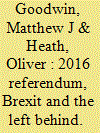

|
|
|
|
|
| Summary/Abstract |
Why did Britain vote for Brexit? What was the relative importance of factors such as education, age, immigration and ethnic diversity? And to what extent did the pattern of public support for Brexit across the country match the pattern of public support in earlier years for eurosceptic parties, notably the UK Independence Party (UKIP)? In this article we draw on aggregate-level data to conduct an initial exploration of the 2016 referendum vote. First, we find that turnout was generally higher in more pro-Leave areas. Second, we find that public support for Leave closely mapped past support for UKIP. And third, we find that support for Leave was more polarised along education lines than support for UKIP ever was. The implication of this finding is that support for euroscepticism has both widened and narrowed—it is now more widespread across Britain but it is also more socially distinctive.
|
|
|
|
|
|
|
|
|
|
|
|
|
|
|
|
| 2 |
ID:
149218


|
|
|
|
|
| Summary/Abstract |
A dynamic of global economic development means that many countries are experiencing uneven development and their citizens are increasingly split between those who can access high-skill jobs and those who cannot. As a result some citizens are living in cosmopolitan areas of growth and others in backwater areas of decline. There are emerging out of these processes two versions of England. In cosmopolitan areas we find an England that is global in outlook, liberal and more plural in its sense of identity. In provincial backwaters we find an England that is inward-looking, relatively illiberal, negative about the EU and immigration, nostalgic and more English in its identity. This bifurcation of England is already having political effects, reflected in the outcome of the 2015 general election. It will further reconfigure politics over the next two decades, creating diverse political citizens and a complex array of challenges and dilemmas for governments, political parties, campaigners and political organisers.
|
|
|
|
|
|
|
|
|
|
|
|
|
|
|
|
| 3 |
ID:
149220
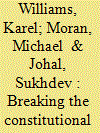

|
|
|
|
|
| Summary/Abstract |
Analysis of constitutional arrangements has been too narrow in the past, confined to examination of explicitly governmental arrangements. But corporate enterprises perform such important public functions, especially in the age of outsourcing, that they need to be incorporated into the constitution. The article develops this argument and proposes a framework for such incorporation.
|
|
|
|
|
|
|
|
|
|
|
|
|
|
|
|
| 4 |
ID:
149205


|
|
|
|
|
| Summary/Abstract |
The Brexit referendum was won in the regions: in the areas where local reporting of local issues has been withering away for decades. Much of the country outside London has no local press. Three quarters of newspaper offices in regional towns have closed since 1999; locally employed journalists (living in the communities they report on) have all but disappeared; courts, hospitals, councils go unreported.1 What purports to be ‘local’ news is all too often just cross-syndicated content produced from the Midlands production hubs of monopolistic newspaper chains.
|
|
|
|
|
|
|
|
|
|
|
|
|
|
|
|
| 5 |
ID:
149229


|
|
|
| 6 |
ID:
149223
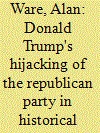

|
|
|
|
|
| Summary/Abstract |
Four aspects of Donald Trump's hijack of the Republican party are examined. First, how he used unconventional techniques, usually associated with some ‘reality’ television programmes, to become the leading candidate in the pre-primary debates. He could thereby develop ‘momentum’ before the primaries began despite his limited support among Republican activists. Second, how his insurgency differed from the party's takeover in 1964 by supporters of Barry Goldwater. Third, how the Republicans have replaced the Democrats since the early 1980s as the party with a less cohesive potential coalition among voters, with the result that internal party relations became more conflictual throughout the period. Finally, that internal conflict has been intensified by two factors in those decades: the prevalence of divided government, which has made it virtually impossible to impose a truly conservative agenda on federal government policy, and the impact of forty years of stagnating real incomes for many middle-income Americans.
|
|
|
|
|
|
|
|
|
|
|
|
|
|
|
|
| 7 |
ID:
149200


|
|
|
| 8 |
ID:
149211
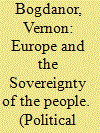

|
|
|
|
|
| Summary/Abstract |
In Britain, commentators on the constitution have an easy life, since we have no constitution. That is because our only constitutional principle is—or perhaps was, until we entered the European Community in 1973—the sovereignty of Parliament. That principle of course conflicts with the principle of the supremacy of European law.
|
|
|
|
|
|
|
|
|
|
|
|
|
|
|
|
| 9 |
ID:
149225
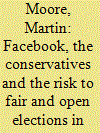

|
|
|
|
|
| Summary/Abstract |
The Conservative party spent £1.2 million on Facebook during the UK 2015 general election campaign. This enabled the party to target specific voters in marginal constituencies with tailored messages. Their use of Facebook in 2015 shows how central digital media had become to their campaign communication. It also shows, however, that this communication may be compromising the principles of fair and open elections in the UK, for example by allowing parties to effectively bypass constituency spending limits and avoid transparency. Unless electoral legislation and regulation are changed to take account of developments in digital media they are liable to become increasingly anachronistic and ineffective.
|
|
|
|
|
|
|
|
|
|
|
|
|
|
|
|
| 10 |
ID:
149217
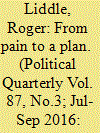

|
|
|
| 11 |
ID:
149208
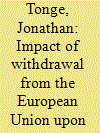

|
|
|
|
|
| Summary/Abstract |
As the only region containing a land frontier with a European Union from which the UK has chosen to depart, Northern Ireland will be particularly significantly affected by withdrawal. It is the prospect of the return of a ‘hard border’ partitioning the island of Ireland, not seen since the Troubles, which is perhaps of greatest concern. However, the status of the border is only one of several issues vexing Northern Ireland. This report concentrates upon the four most important: the lack of consent for withdrawal; the impact upon the Good Friday Agreement; the hardening of the border; and prospects for cross-border trade.
|
|
|
|
|
|
|
|
|
|
|
|
|
|
|
|
| 12 |
ID:
149226
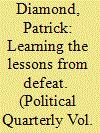

|
|
|
| 13 |
ID:
149202
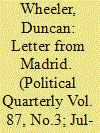

|
|
|
|
|
| Summary/Abstract |
Spain finds itself at an impasse: currently without government, no immediate solution is in sight. Mariano Rajoy and his right-of-centre Partido Popular/Popular Party (PP) received more votes than any other political formation at the general elections held on 20 December 2015, but were significantly short of an absolute majority; even if their MPs had been pooled with those of Ciudadanos—the most market-driven of the recent political start-ups—this would be insufficient to form a government, and none of the other major political parties were willing to play ball with a leader who has behaved in a self-interested, corrupt and authoritarian manner since his election in 2011. The Partido Socialista Obrero Español/Spanish Socialist Workers' Party (PSOE), under the leadership of the physically attractive but seemingly insubstantial Pedro Sánchez then had the opportunity to form their own coalition, but negotiations were far from straightforward.
|
|
|
|
|
|
|
|
|
|
|
|
|
|
|
|
| 14 |
ID:
149224
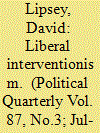

|
|
|
|
|
| Summary/Abstract |
David Lipsey analyses the arguments made by former Labour prime minister Tony Blair in his Chicago speeches for armed liberal intervention in states which are abusing the human rights of their citizens. He traces these arguments back to previous advocates of such intervention such as W. E. Gladstone and Woodrow Wilson. The arguments of Blair and advocates are often compelling in principle. However, in most cases—Iraq and Libya are examples—the practical consequences of military action turn out to be disastrous. Though opposing pacifism, and the ill-thought-out hostility to all things military of Labour's current leader Jeremy Corbyn, Lipsey's advice to those thinking of intervening is: don't.
|
|
|
|
|
|
|
|
|
|
|
|
|
|
|
|
| 15 |
ID:
149222
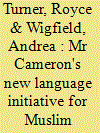

|
|
|
|
|
| Summary/Abstract |
As the government announces a programme to teach Muslim women to speak English, this article examines how such a policy can be implemented successfully, arguing that lessons can be drawn from both academic research, especially that carried out with Muslim women themselves, and previous successful policy application. It focuses on two projects carried out in the recent past for the Learning and Skills Council (LSC) and Jobcentre Plus, and outlines the key factors that led to their success. The LSC project involved one of the largest in-depth surveys of Muslim women's attitudes towards work, and their views on life in Britain, that has ever been undertaken. The Jobcentre Plus project was a highly successful and innovative employment training initiative for ethnic minority women piloted in Sheffield, the very kind of ‘targeted’ approach that Mr Cameron has claimed his government's new language initiative will be.
|
|
|
|
|
|
|
|
|
|
|
|
|
|
|
|
| 16 |
ID:
149210
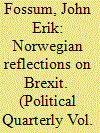

|
|
|
|
|
| Summary/Abstract |
The leave campaigners' main slogan was the need to ‘take back control’. A major concern was for the UK to restore its sovereignty, and they argued that the best way of doing that was for Britain to leave the EU.
|
|
|
|
|
|
|
|
|
|
|
|
|
|
|
|
| 17 |
ID:
149212


|
|
|
|
|
| Summary/Abstract |
‘Take back control’ and ‘we want our country back’ are pre-eminently the principles of engaged democratic citizens. No one listening to the footsoldiers of the Leave campaign could doubt their sincerity or their commitment. Many believed themselves to be fighting for a cause greater than the standard of living or the control of tariffs on goods and services. For them the single market was a mundane matter. Instead, they thought in terms of parliamentary representatives determining the common political life in the UK. They accepted that governments might bungle, but they wanted the right to cashier the bunglers through elections. They wanted to live under rules chosen by the people of the UK. They wanted the democratic autonomy of which Pericles spoke when he praised Athens: our system of government does not copy the institutions of our neighbours; it is more a case of our being a model to others than of our imitating anyone else. Taking this form, the Brexit referendum was thus the victory of nostalgic democracy.
|
|
|
|
|
|
|
|
|
|
|
|
|
|
|
|
| 18 |
ID:
149213


|
|
|
| 19 |
ID:
149203
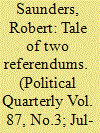

|
|
|
|
|
| Summary/Abstract |
One of the more bruising comments on David Cameron's premiership is that it boils down to one recurring theme: ‘doing what [Harold] Wilson did, only a little bit worse’.1 In the wake of the referendum, that verdict now looks generous. Like Cameron, Wilson was a reluctant European who led a divided party at a time of rising euroscepticism. Like Cameron, he pledged to renegotiate the terms of British membership and put them to the public in a referendum. The difference lies in the verdict. When the polls closed on 5 June 1975, Wilson had won a landslide for membership, winning more than two-thirds of the popular vote. Every part of the United Kingdom voted to stay in, with the exception only of Shetland and the Western Isles.
|
|
|
|
|
|
|
|
|
|
|
|
|
|
|
|
| 20 |
ID:
149219


|
|
|
|
|
| Summary/Abstract |
In a recent issue of The Political Quarterly, Richards and Smith critiqued Flinders’ work on anti-politics, suggesting that there needs to be much more focus on supply-side explanations and recognising that much of the problem lies with politicians, contra Flinders. Here, we argue instead that it is crucial to recognise how supply-side and demand side explanations interact. For us, politicians need to be more responsive to citizens, but, at the same time, citizens need to recognise problems of contemporary governing. Overall, much is changing in the way in which citizens engage and it is crucial that these changes are understood.
|
|
|
|
|
|
|
|
|
|
|
|
|
|
|
|
|
|
|
|
|